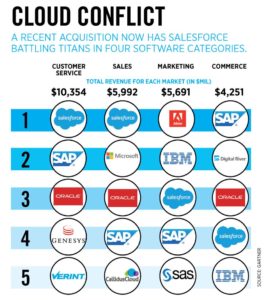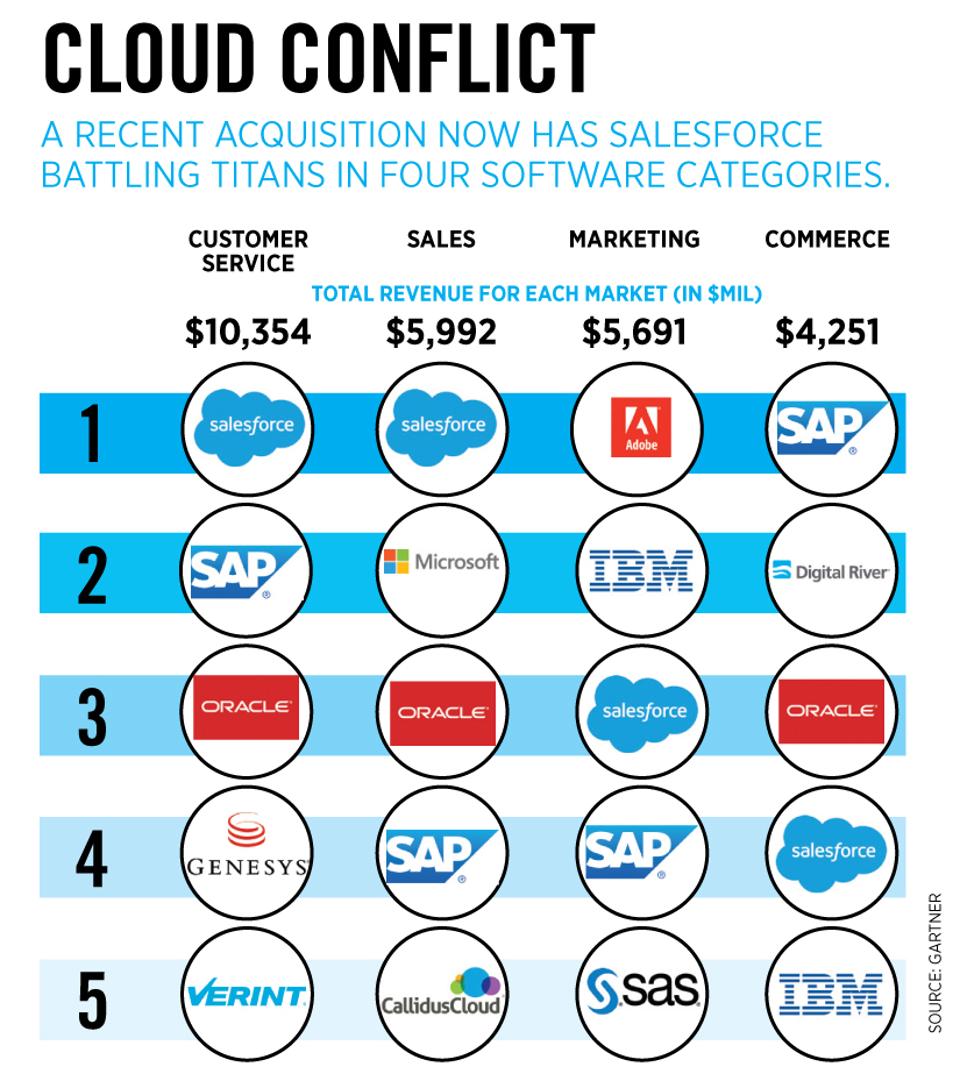He may not be able to have LinkedIn, but Salesforce CEO Marc Benioff isn’t hesitating to buy up a whole lot else. One day before its annual Dreamfo
He may no
One day before its annual Dreamforce conference is set to begin in San Francisco, Salesforce announced it was acquiring Krux, a San Francisco company that provides a data management platform to help marketers. The Wall Street Journal first reported the agreement for the acquisition, which is now confirmed on Krux’s corporate website. The price tag, for $700 million in cash and stock, was confirmed to Forbes by sources with knowledge of the deal and by a regulatory filingfrom Salesforce which disclosed the company plans to pay $340 million as the cash portion.
Krux was founded in 2010 and had raised more than $48 million from outside investors across several funding rounds, according to data from PitchBook, including from Accel Partners, IDG Ventures and Sapphire Ventures. Krux had been named a leader in Forrester’s tracking of the DMP market in December 2015 and claims to work with more than 200 customers, according to its corporate website. The company operated 10 offices as of January 2016 and worked with clients including Kellogg and Time Warner.
Paying $700 million for Krux is a hefty jump from its last known valuation, which was reportedly about $150 million at its Series B raiseannounced in June 2014. More than two years later, Krux is undoubtedly a bigger business in a category that’s seen consolidation in recent months. But it would also seem to suggest a premium that could point to Salesforce’s hunger to close the deal or rival bids.
“We’re trading gas for rocket fuel,” Krux CEO Tom Chavez wrote shareholders and employees in a blog post announcing the deal on Monday. In an interview with the Journal when he’d raised that last funding round , Chavez had argued that his company is more of a data play than one in the more turbulent ad tech market. Krux doesn’t sell its own ads and can help companies depend less on Google and Facebook for consumer information, he had said, with files on tens of millions of consumer actions.
He may not be able to have LinkedIn, but Salesforce CEO Marc Benioff isn’t hesitating to buy up a whole lot else.
One day before its annual Dreamforce conference is set to begin in San Francisco, Salesforce announced it was acquiring Krux, a San Francisco company that provides a data management platform to help marketers. The Wall Street Journal first reported the agreement for the acquisition, which is now confirmed on Krux’s corporate website. The price tag, for $700 million in cash and stock, was confirmed to Forbes by sources with knowledge of the deal and by a regulatory filingfrom Salesforce which disclosed the company plans to pay $340 million as the cash portion.
Krux was founded in 2010 and had raised more than $48 million from outside investors across several funding rounds, according to data from PitchBook, including from Accel Partners, IDG Ventures and Sapphire Ventures. Krux had been named a leader in Forrester’s tracking of the DMP market in December 2015 and claims to work with more than 200 customers, according to its corporate website. The company operated 10 offices as of January 2016 and worked with clients including Kellogg and Time Warner.
Paying $700 million for Krux is a hefty jump from its last known valuation, which was reportedly about $150 million at its Series B raiseannounced in June 2014. More than two years later, Krux is undoubtedly a bigger business in a category that’s seen consolidation in recent months. But it would also seem to suggest a premium that could point to Salesforce’s hunger to close the deal or rival bids.
“We’re trading gas for rocket fuel,” Krux CEO Tom Chavez wrote shareholders and employees in a blog post announcing the deal on Monday. In an interview with the Journal when he’d raised that last funding round , Chavez had argued that his company is more of a data play than one in the more turbulent ad tech market. Krux doesn’t sell its own ads and can help companies depend less on Google and Facebook for consumer information, he had said, with files on tens of millions of consumer actions.
Fast forward two years and change, and Krux is claiming to analyze “trillions of signals” for marketers. That’s catnip for Salesforce’s current desire to work in as much data as possible into its marketing software, an area in which it’s chasing Adobe and IBM but has seen the departure of several key executives, both brought in through its $2.5 billion acquisition of ExactTarget in 2013. Salesforce’s marketing unit also lags its other “clouds,” or major lines of business, in Gartner’s magic quadrant of leading software providers.
Salesforce president Alex Dayon signaled to the Journal in the news on Monday that Krux’s data would specifically be useful in the marketing cloud’s artificial intelligence capabilities. Salesforce has spent significant money and staffing resources on a new initiative it announced in August, called Salesforce Einstein, as CEO Marc Benioff’snext major line of business to focus on at Dreamforce and in the months to come. In marketing, that could mean helping to predict the best audiences to reach out to with ads, know when to follow up in campaigns and how to distribute resources between different media types. Krux’s data would presumably plug into that capability to improve the platform’s ability to know which customers are the most likely to buy.
Forbes has reached out to Salesforce for comment and will update this story when it hears back. Dreamforce gets under way on Tuesday, with Benioff’s keynote in which he’s expected to discuss a whole lot of AI, as well as the company’s acquisitions of Quip in collaboration andDemandware in commerce. But investors will also be curious for any scraps of information he might share about Salesforce’s rumored ambitions to acquire Twitter while Benioff’s encouraged regulators to block Microsoft’s planned acquisition of LinkedIn, a company Benioff sorely wanted for Salesforce. In August, he told Forbes in its cover story, “When I get something in my head, it’s hard for me to just let it go.”
forbes.com

